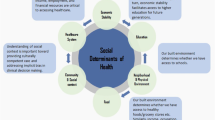Abstract
Guyanese immigrants are the 5th largest foreign-born group in NY State, but sparse literature is available on their health status and health needs. A community-based health interview survey of Schenectady NY residents aged 18–64 (N = 1861) was analyzed. Bivariate comparisons between Guyanese respondents and White, Black, and Hispanic respondents were made for each variable to identify disparities. As predominantly low SES immigrants, Guyanese adults were less likely to be covered by health insurance, have a usual place for care, and receive cancer screenings. They were more likely to engage in alcohol binge drinking, but generally in good overall physical and mental health and less likely to smoke or report disability. Stable family structure and supportive interpersonal relationships are major assets of this group. Improved access to affordable health insurance, linkages to primary care, targeted cancer screening programs, and culturally-sensitive behavioral health services are recommended for Guyanese immigrants.
Similar content being viewed by others
References
U.S. Department of Homeland Security. Yearbook of Immigration Statistics 2014. Washington, D.C.: U.S. Department of Homeland Security; 2015. https://www.dhs.gov/immigration-statistics/yearbook/2014. Accessed 28 Feb 2017.
United States Census Bureau. American Community Survey. Washington, D.C.: United States Department of Commerce; 2015. http://www.census.gov/programs-surveys/acs/. Accessed 28 Feb 2017.
City of New York Department of City Planning. The newest New Yorkers: characteristics of the city’s foreign-born population. New York; 2013.
Silbiger JJ, Stein R, Trost B, Shaffer J, Kim J, Cohen P, et al. Coronary angiographic findings and conventional coronary artery disease risk factors of Indo-Guyanese immigrants with stable angina pectoris and acute coronary syndromes. Ethn Dis. 2012;22:12–4.
Back EE, Bachwani AS, Strogatz DS, Sherman ZMV. Profile of diabetes mellitus among immigrants from Guyana: epidemiology and implications for community action. Ethn Dis. 2012;22:473–8.
Kim M, Van Wye G, Kerker B, Thorpe L, Frieden T. The health of immigrants in New York City. New York: New York City Department of Health and Mental Hygiene; 2006.
Hosler AS, Pratt DS, Sen KA, Buckenmeyer EM, Simao A, Back EE, et al. High prevalence of diabetes among Indo-Guyanese adults, Schenectady, New York. Prev Chronic Dis 2013;10:E43.
Hosler AS, Solanki MN, Savadatti S. Assessing needs and feasibility of diabetes self-management coaching at faith-based organizations for Indo-Guyanese immigrants. Diabetes Educ. 2015;41:320–7.
Bhattacharya R. The Sly Company of People who Care. New York: Farrar, Straus and Giroux; 2011.
Institute of Medicine. The future of the public’s health in the 21st century. Washington, D.C.: The National Academies Press; 2003.
Abraído-Lanza AF, Dohrenwend BP, Ng-Mak DS, Turner JB. The Latino mortality paradox: a test of the “salmon bias” and healthy migrant hypotheses. Am J Public Health. 1999;89:1543–8.
National Association of County and City Health Officials. Mobilizing for action through planning and partnerships. Washington, D.C.: National Association of County and City Health Officials; 2000.
Hosler AS, Michaels IH, Buckenmeyer EM. Food shopping venues, neighborhood food environment, and body mass index among urban Guyanese, black, and white adults. J Nutr Educ Behav. 2016;48:361–8.
United States Prevention Services Task Force. Recommendations for primary care practice. https://www.uspreventiveservicestaskforce.org/. Accessed 28 May 2017.
Hsu WC, Araneta MRG, Kanaya AM, Chang JL, Fujimoto WY. BMI cut points to identify at-risk Asian Americans for type 2 diabetes screening. Diabetes Care. 2015;38:150–8.
Cohen S, Kamarck T, Mermelstein R. A global measure of perceived stress. J Health Soc Behav. 1983;24:385–96.
Radloff LS. The CES-D scale: a self report depression scale for research in the general population. Appl Psychol Meas. 1977;1:385–401.
Chew LD, Bradley KA, Boyko EJ. Brief questions to identify patients with inadequate health literacy. Fam Med. 2004;36:588–94.
Williams DR, Yan Y, Jackson JS, Anderson NB. Racial differences in physical and mental health: socio-economic status, stress and discrimination. J Health Psychol. 1997;2:335–51.
Lewis TT, Aiello AE, Leurgans S, Kelly J, Barnes LL. Self-reported experiences of everyday discrimination are associated with elevated C-reactive protein levels in older African-American adults. Brain Behav Immun. 2010;24:438–43.
Lucas JW, Barr-Anderson DJ, Kington RS. Health status, health insurance, and health care utilization patterns of immigrant Black men. Am J Public Health. 2003;93:1740–7.
Carrasquillo O, Carrasquillo AI, Shea S. Health insurance coverage of immigrants living in the United States: differences by citizenship status and country of origin. Am J Public Health. 2000;90:917–23.
Ku L, Matani S. Left out: immigrants’ access to health care and insurance. Health Aff. 2001;20:247–56.
Echeverria SE, Carrasquillo O. The roles of citizenship status, acculturation, and health insurance in breast and cervical cancer screening among immigrant women. Med Care. 2006;44:788–92.
World Health Organization. Preventing suicide: a global imperative, 2014. Geneva, Switzerland: World Health Organization; 2014. http://www.who.int/mental_health/suicide-prevention/world_report_2014/en/. Accessed 28 Feb 2017.
Harry B, Balseiro J, Harry I, Schultz A, Mc Bean R. Profile of suicidal behaviour in Guyana. A retrospective study from 2010 to 2012. Caribbean Public Health Agency 60th Annual Scientific Meeting; 2015; Kingston, Jamaica: West Indian Medical Journal Supplement. [Conference Abstract].
McDonald JT, Kennedy S. Insights into the ‘healthy immigrant effect’: health status and health service use of immigrants to Canada. Soc Sci Med. 2004;59:1613–27.
Wilson LC, Wilson CM, Johnson BM. Race and health in Guyana: an empirical assessment from survey data. Caribb Stud. 2010;38(1):37–58.
Roopnarine JL, Wang Y, Krishnakumar A. Moderating role of social support on the associations between individual level factors and depressive symptoms in young adults in Guyana and Trinidad and Tobago. West Indian Med J. 2016. doi:10.7727/wimj.2015.355.
Lacey KK, Powell Sears K, Crawford TV, Matusko N, Jackson JS. Relationship of social and economic factors to mental disorders among population-based samples of Jamaicans and Guyanese. BMJ Open. 2016;6(12):e012870.
Acknowledgements
The Schenectady Foundation provided funding for the UMS survey. We thank Ellis Medicine in Schenectady for their support of this study.
Author information
Authors and Affiliations
Corresponding author
Rights and permissions
About this article
Cite this article
Hosler, A.S., Kammer, J.R. A Comprehensive Health Profile of Guyanese Immigrants Aged 18–64 in Schenectady, New York. J Immigrant Minority Health 20, 972–980 (2018). https://doi.org/10.1007/s10903-017-0613-5
Published:
Issue Date:
DOI: https://doi.org/10.1007/s10903-017-0613-5



